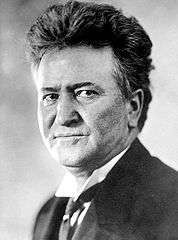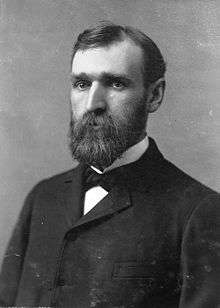Wisconsin Idea
The Wisconsin Idea is the policy developed in the U.S. state of Wisconsin that fosters public universities' contributions to the state: "to the government in the forms of serving in office, offering advice about public policy, providing information and exercising technical skill, and to the citizens in the forms of doing research directed at solving problems that are important to the state and conducting outreach activities".[1] A second facet of the philosophy is the effort "to ensure well-constructed legislation aimed at benefiting the greatest number of people".[2] During the Progressive Era, proponents of the Wisconsin Idea saw the state as "the laboratory for democracy", resulting in legislation that served as a model for other states and the federal government.[2]
| Part of a series on |
| Progressivism |
|---|
|
Ideas
|
|
By region |
|
In education
The Wisconsin Idea is a philosophy embraced by the University of Wisconsin System (UW System) that holds that university research should be applied to solve problems and improve health, quality of life, the environment, and agriculture for all citizens of the state. As explained by Adlai Stevenson, "the Wisconsin tradition meant more than a simple belief in the people. It also meant a faith in the application of intelligence and reason to the problems of society. It meant a deep conviction that the role of government was not to stumble along like a drunkard in the dark, but to light its way by the best torches of knowledge and understanding it could find."[1]
This Progressive-era policy applied the expertise of the state's university to social legislation that benefited all the state's citizens; it led to classic programs such as regulation of utilities, workers' compensation, tax reform, and university extension services; sometimes expressed in the maxim that "the boundaries of the university are the boundaries of the state".[3]
For more than a century, the university system has been guided by the Wisconsin Idea, a tradition first enunciated by University of Wisconsin President Charles Van Hise in 1904. Van Hise declared that he would "never be content until the beneficent influence of the university reaches every family in the state". Today that belief permeates the UW System's work, fostering close working relationships within the state, throughout the country, and around the world.
In 2015, Wisconsin Governor Scott Walker's budget proposal included the removal of the Wisconsin Idea from the University of Wisconsin's mission statement. Walker proposed replacing the mission's goal to "extend knowledge and its application beyond the boundaries of its campus" and to "serve and stimulate society" with a goal "to meet the state's workforce needs". After negative reaction from politicians and the public, the Wisconsin Idea was restored to the budget proposal.[4]
In politics

The Wisconsin Idea, in United States History, also refers to a series of political reforms of the late 19th century and early 20th century whose strongest advocate was Robert M. La Follette, Sr., Wisconsin's governor (1901–1906) and senator (1906–1925). The Wisconsin Idea was created by the state's progressives to do away with monopolies, trusts, high cost of living, and predatory wealth, which they saw as the problem that must be solved or else "no advancement of human welfare or progress can take place".[5] Reforms in labor rights were one of the major aspects of the Wisconsin Idea. The progressive worker's compensation program was first introduced by German immigrants, who were abundant in Wisconsin. The system was adopted from the existing system in Germany, which was based on the idea that the employer was obligated to take care of his employees and keep paying them as they grew old.[6] Many of the reforms were based on traditions and customs brought to the state by German immigrants. The emphasis on higher learning and well-funded universities stressed by the Wisconsin Idea was derived from the education system of Germany. Progressives also proposed the first state income taxes, as well as submitting the idea of a progressive tax. They also passed legislation prohibiting pollution and police brutality.[7]
The Wisconsin Idea would go on to set an example for other states in the United States. The progressive politicians of the time sought to emulate and ultimately transcend the states of the east coast in regards to labor laws. Wisconsin progressives wished to make Wisconsin into a benchmark for other Midwestern states to strive towards. Although many of the reforms went through in 1911, conservative opponents of the progressive party took control of Wisconsin in 1914, thus minimizing the magnitude and effects of the reforms.[8] The Wisconsin Idea would continue to be a revolutionary precedent for other universities, and its educational aspects are still relevant today. Robert La Follette, Sr. was the man who implemented much of this legislation, and he was among the earliest supporters of direct election of senators, which is now a national practice. These progressive politicians also helped pass the Sixteenth and Seventeenth Amendments to the American Constitution.
These proposed reforms, all of which were eventually adopted, included:
- Primary elections, allowing the rank-and-file members of a political party to choose its nominees rather than caucuses usually dominated by political bosses.
- Workers' compensation, allowing workers injured whilst working to receive a fixed payment in compensation for their injuries and related expenses rather than forcing them to go to court against their employers, which at the time was extremely difficult and had little realistic chance of success.
- State regulation of railroads in addition to the federal regulation imposed by the Interstate Commerce Commission.
- Direct election of United States Senators as opposed to the original method of their selection by the state legislatures, eventually ratified as the Seventeenth Amendment to the United States Constitution.
- Progressive taxation, where the wealthier pay a higher rate of tax than the less-affluent, made possible on the federal level in part by the adoption of the Sixteenth Amendment to the United States Constitution.
Adoption of these reforms marked the high point of the Progressive Era.
In media
Wisconsin Public Radio, formerly a division of the University of Wisconsin-Extension, was established to bring the Wisconsin Idea to the broadcast airwaves. From the WPR Mission Statement: "WPR's Mission is to realize the Wisconsin Idea by producing, acquiring and delivering high quality audio programming that serves the public's need to discuss ideas and opinions, and that provides cultural enrichment, intellectual stimulation, and intelligent, enlightening entertainment." [9]
References
- Stark, Jack (1995). "The Wisconsin Idea: The University's Service to the State". In Wisconsin Legislative Reference Bureau (ed.). State of Wisconsin 1995-1996 Blue Book. Madison: Wisconsin Legislature Joint Committee on Legislative Organization. pp. 100–179.
- Myers, R. David (Fall 1991). "The Wisconsin Idea: Its National and International Significance". Wisconsin Academy Review. 37 (4): 4–7. Archived from the original on 2017-03-08. Retrieved 11 April 2010.
- "the boundaries of the campus are the boundaries of the state." Wisconsin Historical Society. History of the Wisconsin Idea.
- Press, SCOTT BAUER Associated (2015-02-04). "Walker backs off removing 'Wisconsin Idea' from UW mission".
- Charles McCarthy. The Wisconsin Idea. New York: Macmillan, 1912, Chapter 1.
- McCarthy, Chapter 6.
- McCarthy, Conclusion.
- Knox, Alan B.; Corry, Joe (1995). "The Wisconsin Idea for the 21st Century". In Wisconsin Legislative Reference Bureau (ed.). State of Wisconsin 1995-1996 Blue Book. Madison: Wisconsin Legislature Joint Committee on Legislative Organization. pp. 181–192.
- "Wisconsin Public Radio Programming Mission and Strategy". wpr.org. Archived from the original on 2012-07-12.
Further reading
- Altmeyer, Arthur J. "The Wisconsin Idea and Social Security", Wisconsin Magazine of History, vol. 42, no. 1 (Autumn 1958), pp. 19–25.
- Carrington, Paul D. and King, Erika., "Law and the Wisconsin Idea" (1997). Duke Law Faculty Scholarship, Paper 192.
- Carstensen, Vernon. "The Origin and Early Development of the Wisconsin Idea", Wisconsin Magazine of History, vol. 39, no. 3 (Spring 1956), pp. 181–188.
- Davidson, Randall. 9XM Talking: WHA Radio and the Wisconsin Idea. Madison: University of Wisconsin Press, 2006. ISBN 0-299-21870-8
- Doan, Edward N. The La Follettes and the Wisconsin Idea. New York: Rinehart, 1947.
- Heinen, Neil. "Wisconsin’s Great Idea". Madison Magazine, January 2012.
- Hoeveler, J. David, Jr. "The University and the Social Gospel: The Intellectual Origins of the 'Wisconsin Idea'", Wisconsin Magazine of History, vol. 59, no. 4 (Summer 1976), pp. 282–298.
- Howe, Frederic C. Wisconsin: An Experiment in Democracy. New York: Scribner's, 1912.
- McCarthy, Charles. The Wisconsin Idea. New York: Macmillan Company, 1912.
- MacLean, Elizabeth K. "Joseph E. Davies: The Wisconsin Idea and the Origins of the Federal Trade Commission," Journal of the Gilded Age and Progressive Era (July 2007).
- Ward, David. "Serving the State: The Wisconsin Idea Revisited," Educational Record, vol. 73, no. 2 (Spring 1992), pp. 12–16.
External links
- The Wisconsin Idea, University of Wisconsin-Madison
- Wisconsin Idea at Wisconsin Academy of Sciences, Arts and Letters
- Progressivism and the Wisconsin Idea, documents at the Wisconsin Historical Society
